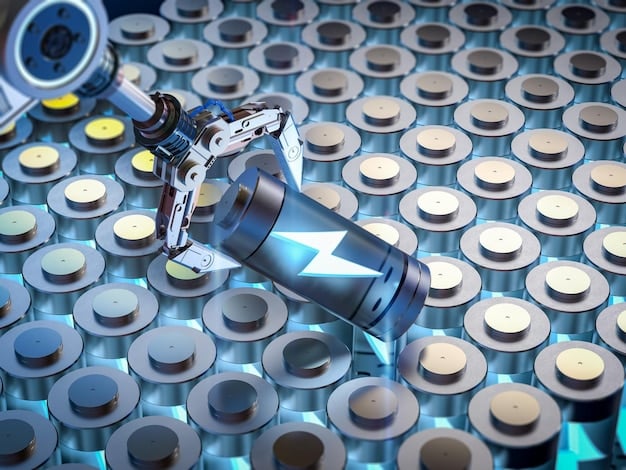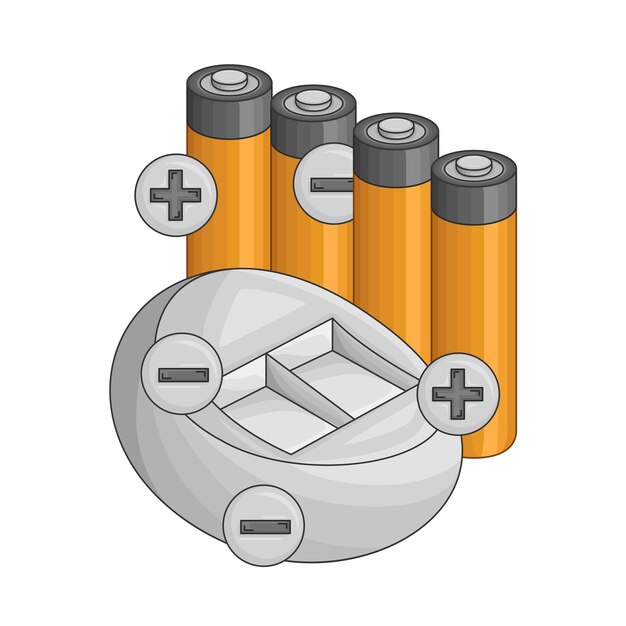The Future of Electric Vehicles: US Tech’s Battery Innovation

The future of electric vehicles (EVs) is being significantly shaped by US tech companies, which are at the forefront of battery technology innovation, enhancing performance, range, and sustainability.
The automotive industry is undergoing a massive transformation, with electric vehicles (EVs) leading the charge. At the heart of this revolution are advancements in battery technology, and US tech companies are playing a pivotal role. Understanding **the future of electric vehicles: how US tech companies are driving innovation in battery technology** is crucial for anyone interested in the future of transportation.
US Tech Giants Leading the Charge in EV Battery Innovation
Several major US tech companies are heavily invested in developing and improving EV battery technology. These companies bring unique expertise and resources to address the challenges associated with battery performance, cost, and sustainability.
From pioneering new battery chemistries to optimizing manufacturing processes, these companies are driving innovation at every stage of the battery lifecycle.
Tesla: Setting the Standard for EV Batteries
Tesla has long been a leader in the EV market, and its advancements in battery technology have been instrumental to its success. The company’s battery packs are known for their high energy density and long lifespan.
Tesla’s focus on vertical integration, including battery production, allows it to control costs and optimize performance effectively.
General Motors: A Legacy Automaker’s Electric Push
General Motors (GM) is making a significant transition to electric vehicles, and battery technology is central to its strategy. GM’s Ultium battery platform is designed to be flexible and scalable, supporting a wide range of EV models.
GM is also investing in research and development to improve battery chemistry and reduce reliance on scarce materials.

Key areas where US tech companies are focusing their efforts include:
- Improving energy density to increase the range of EVs.
- Reducing charging times through innovations in battery design and charging infrastructure.
- Enhancing battery lifespan and durability to lower the total cost of ownership.
- Developing more sustainable battery materials and manufacturing processes.
The innovations driven by these companies are not only transforming the EV market but also contributing to a more sustainable transportation future. By pushing the boundaries of battery technology, they are paving the way for EVs to become more affordable, efficient, and environmentally friendly.
Advancements in Battery Chemistry: Paving the Way for Better EVs
One of the most critical areas of innovation in EV battery technology is the chemistry of the batteries themselves. US tech companies are actively exploring new materials and formulations to improve battery performance and safety.
The goal is to create batteries that can store more energy, charge faster, and operate safely under a wide range of conditions.
Lithium-Ion Batteries: The Current Standard
Lithium-ion batteries are currently the dominant technology in the EV market. However, there is still room for improvement, and US tech companies are working on advancements such as:
High-nickel cathode materials to increase energy density.
Silicon anodes to further boost energy storage capacity.
Solid-State Batteries: The Next Generation
Solid-state batteries are considered the holy grail of EV battery technology. They replace the liquid electrolyte in traditional lithium-ion batteries with a solid material, offering several potential advantages:
- Higher energy density for extended range.
- Faster charging times due to improved ion conductivity.
- Enhanced safety because solid electrolytes are less flammable.
- Longer lifespan and greater stability.
US tech companies are investing heavily in solid-state battery research and development, with the aim of bringing this technology to market in the coming years. Success in this area could revolutionize the EV industry.

The Role of Software and AI in Battery Management
Battery management systems (BMS) are crucial for optimizing the performance and lifespan of EV batteries. These systems use software and AI to monitor and control various aspects of battery operation.
US tech companies are leveraging their expertise in software and AI to develop advanced BMS solutions that can:
Optimize Battery Performance
BMS algorithms can dynamically adjust charging and discharging parameters to maximize energy efficiency and extend battery range. These adjustments can be based on factors such as driving conditions, temperature, and battery age.
Enhance Battery Safety
BMS software can detect and prevent potential safety hazards, such as overcharging, overheating, and cell imbalances. Early detection of these issues can prevent catastrophic failures and ensure the safety of EV occupants.
AI-Powered Predictive Maintenance
AI can be used to analyze battery data and predict potential issues before they arise. This allows for proactive maintenance and prevents unexpected breakdowns, enhancing the reliability of EVs.
The combination of advanced battery chemistries and intelligent management systems is unlocking new possibilities for EV performance and longevity. As US tech companies continue to innovate in these areas, EVs are becoming more practical and appealing to a wider range of consumers.
AI and machine learning algorithms can predict battery degradation, optimize charging patterns, and ensure safe operation.
Infrastructure Development: Accelerating EV Adoption in the US
While advancements in battery technology are essential for the future of EVs, they are not the only factor driving adoption. The availability of charging infrastructure is also critical, and US tech companies are playing a key role in expanding the charging network.
These companies are developing innovative charging solutions and partnering with other stakeholders to deploy charging stations across the country.
Tesla’s Supercharger Network
Tesla has invested heavily in building its Supercharger network, which provides fast and convenient charging for Tesla owners. The network spans major highways and urban areas, making long-distance travel in a Tesla EV more practical.
Electrify America: A Multi-Billion Dollar Investment
Electrify America is a company created as part of the Volkswagen diesel emissions settlement. It is investing billions of dollars in building a nationwide network of fast-charging stations for all EV brands.
Electrify America’s network includes both DC fast chargers, which can provide a significant charge in a short amount of time, and Level 2 chargers, which are suitable for overnight charging at home or work.
These companies are installing charging stations in convenient locations, such as:
- Shopping centers
- Gas stations
- Rest areas
- Apartment complexes
The expansion of the charging network is making it easier for EV owners to charge their vehicles, reducing range anxiety and encouraging more people to switch to electric mobility.
Sustainability and Ethical Sourcing: Building a Responsible EV Industry
As the EV industry grows, it is essential to address concerns about the sustainability and ethical sourcing of battery materials. US tech companies are taking steps to ensure that their batteries are produced in an environmentally responsible and socially conscious manner.
These companies are working to:
Reduce Reliance on Scarce Materials
Researchers are exploring alternative battery chemistries that use more abundant and sustainable materials. This includes sodium-ion batteries and lithium-sulfur batteries, which have the potential to reduce reliance on lithium and cobalt.
Improve Battery Recycling
Recycling batteries is crucial for recovering valuable materials and preventing environmental contamination. US tech companies are investing in battery recycling technologies and establishing partnerships with recycling facilities.
Ensure Ethical Sourcing
Companies are implementing due diligence processes to ensure that battery materials are sourced ethically and that human rights are respected throughout the supply chain. This includes working with suppliers to improve labor practices and prevent child labor.
The EV industry has the potential to contribute to a more sustainable future, but it is essential to address environmental and social concerns. By prioritizing sustainability and ethical sourcing, US tech companies can help build a responsible and equitable EV industry.
By focusing on responsible sourcing and recycling, these companies aim to minimize the environmental impact of EV batteries.
The Economic Impact of EV Battery Innovation in the US
The development of advanced EV battery technology is not only transforming the transportation sector but also creating significant economic opportunities in the US. US tech companies are investing billions of dollars in research, development, and manufacturing, creating jobs and driving economic growth.
The EV battery industry is generating economic benefits through:
Job creation in battery manufacturing, research, and development.
Increased demand for raw materials and components.
New business opportunities in battery recycling and repurposing.
- Attracting foreign investment in US battery manufacturing facilities.
- Reduced reliance on foreign oil imports.
- Strengthening US competitiveness in the global EV market.
The US government is also supporting the EV battery industry through tax incentives, grants, and research funding. These policies are designed to accelerate the development of advanced battery technologies and promote domestic manufacturing.
The economic benefits of EV battery innovation extend beyond the automotive sector. The technologies developed for EV batteries can also be applied to other applications, such as energy storage for renewable energy sources.
| Key Point | Brief Description |
|---|---|
| ⚡ Battery Chemistry | Innovations in lithium-ion and solid-state batteries boost EV performance. |
| 🔋 Battery Management | AI and software optimize battery life and safety in EVs. |
| 🔌 Infrastructure | Expanding charging networks ease EV adoption across the US. |
| 🌱 Sustainability | Ethical sourcing and recycling are key to a responsible EV industry. |
FAQ
▼
Solid-state batteries replace the liquid electrolyte of lithium-ion batteries with a solid material, enhancing energy density, safety, and charging speed.
▼
AI optimizes battery performance, predicts maintenance needs, and ensures safe operation by monitoring and adjusting charging and discharging parameters.
▼
Electrify America is a company investing billions to build a nationwide fast-charging network for all EV brands, improving US charging infrastructure.
▼
Ethical sourcing ensures responsible and sustainable mining practices, preventing human rights abuses and minimizing environmental impact in battery production.
▼
The US government supports EV battery innovation with tax incentives, grants, and research funding, accelerating the development of advanced battery technologies.
Conclusion
In conclusion, US tech companies are at the forefront of driving innovation in EV battery technology, addressing key challenges related to performance, cost, and sustainability, paving the way for a cleaner and more efficient transportation future.